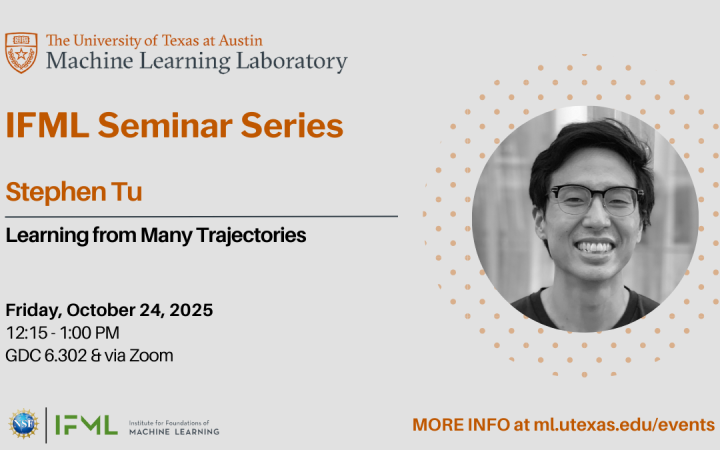Events
IFML Seminar
IFML Seminar: 10/24/25 - Learning from Many Trajectories
Stephen Tu, Assistant Professor, Department of Electrical & Computer Engineering, University of Southern California
-The University of Texas at Austin
Gates Dell Complex (GDC 6.302)
2317 Speedway
Austin, TX 78712
United States

Abstract: Learning from sequential, temporally-correlated data is a core facet of modern machine learning and statistical modeling. Yet our fundamental understanding of sequential learning remains incomplete, particularly in the multi-trajectory setting where data consists of many independent realizations of a time-indexed stochastic process. This important regime both reflects modern training pipelines–e.g., for large language and vision-language models–and offers the potential for learning under much weaker assumptions than needed for the classical single-trajectory case.
This talk will highlight our recent efforts towards a deeper understanding of learning from many trajectories, beyond naive i.i.d. reductions. We first start from the basic problem of linear least-squares regression with dependent covariates. Given n-dimensional examples produced by m trajectories, each of length T, we show that the worst-case excess risk of this problem is Θ(n/mT) whenever m exceeds a constant factor the dimension n. Notably, this error rate behaves as if all of the examples were independent, drawn from their time-marginals. We then consider more general models and loss functions via an approach we call the Hellinger localization framework—a general recipe for deriving instance-optimal parameter recovery rates for maximum likelihood estimation over multiple trajectories. Applying our framework yields sharp bounds across a diverse set of problems, including generalized linear models with non-monotonic activations and a simple linear-attention sequence model, under a fairly natural set of assumptions. We conclude with future directions for applying Hellinger localization to more structured forms of dependency, and to downstream objectives beyond just parameter recovery, e.g., filtering and control tasks.
Bio: Stephen Tu is an assistant professor in the Department of Electrical and Computer Engineering at the University of Southern California. His research interests span statistical learning theory, safe and optimal control, and generative modeling. Specifically, his work focuses on non-asymptotic guarantees for learning dynamical systems, rigorous analysis of distribution shift in feedback settings, safe control synthesis, and more recently foundations of generative modeling. Stephen earned his Ph.D. in Electrical Engineering and Computer Sciences (EECS) from the University of California, Berkeley. Previous to joining USC, Stephen was a research scientist at Google DeepMind Robotics where he focused on combining learning and control-theoretic approaches for robotics.
Zoom link: https://utexas.zoom.us/j/84254847215
Zoom link: https://utexas.zoom.us/j/84254847215